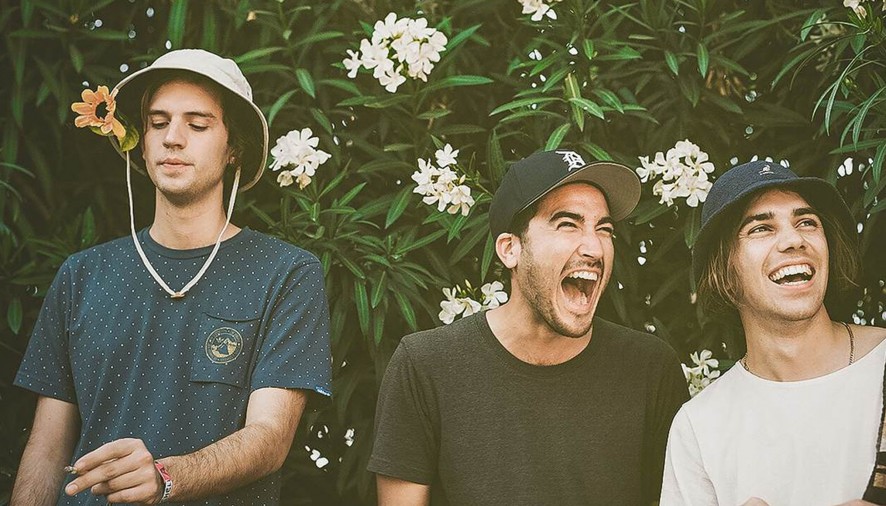Jagwar Ma burst onto the scene in 2013 with Howlin’, establishing their own blend of 90’s nostalgia, dance and psychedelic rock. Maise Leddy caught up with vocalist Gabriel Winterfield ahead of their UK tour to discuss new release Every Now And Then….
Your upcoming UK tour starts next week. Are you looking forward to going round the UK circuit again?
Yeah, definitely! The UK is sort of like a second home to us so it’s always great to come back.
Your first album Howlin’ was a critical and commercial success. Did you feel any pressure from the ‘curse’ of the sophomore album whilst writing the new record?
I don’t think it’s that important really. It’s more important to try and ignore those things and make a record with sincerity, whilst still taking note of what your audience liked from the first record. I think when you make a second record the characters of the people making it start to come out more – we were conscious of what people had liked, but also wanted to extend the narrative of who we are.
You finished recording and mixing the album in a studio in Tottenham. How did that come about?
Jono has a studio there. Seven Sisters [in Tottenham] is one of the few places in London you can afford studio space, it’s so expensive – there’s still a bit of industrial estate there that hasn’t been converted into organic cafes and shit like the rest has! We’re semi based in London, so it made sense to finish up the record there.
The London nightlife scene is in something of a crisis at the moment. As makers of dance music, what’s your opinion on the clash between politics and dance culture and what needs to be done to stop it?
It’s funny, listening to the arguments that go for and against the issue, it’s like people aren’t even speaking the same language. All the creatives start talking about the importance of dance and physical culture, whilst everyone in politics just talks about safety and money. The same thing’s happening in Sydney. There’s been two marches in Sydney now, each one with like 20,000 people. Landowners understand that they can make more money with that space than it being a club, but what needs to be recognised is that a city can’t just be about making money otherwise it’ll end up devoid of any soul. You’ve got to take a step back and see that clubs and music are important. I know that in Paris they subsidise a lot of cafes and bars to keep them running, because they value culture above all else. As part of the free world, this is what we celebrate, we should want a nightclub with a bunch of people from all walks of life dancing together. A conversation needs to be had, but it doesn’t need to be an argument.
It’s hard not to draw parallels between you and fellow Aussies Tame Impala. Can you see yourself following a similar trajectory into the mainstream like they had with Currents this year?
Possibly, it depends if the music’s good enough! I don’t think it’s a given. We want to play music to as many people as we can, so if we could be so lucky then of course, but we wouldn’t want to compromise what we’re doing. The great thing about Tame Impala is that Currents has crossed over but the band haven’t changed. They just write beautiful music, and it’s so nice when music in the charts is actually really good. Pop music shouldn’t just win by majority, it should be unanimous. It should be like ‘Billie Jean’ type shit – everyone likes that song. Often those tracks reach success as the result of someone bringing what they do into the mainstream as opposed to conforming to the status quo, and they’re the tracks you remember. I take inspiration from that, it’s a tough thing to do but it’s definitely something I strive for.
Were there particular artists that were inspiration on this record?
Finding someone that dances to the beat of their own drum is always inspiring, genre aside. I think the days of being inspired directly by an artist are behind us – that happens when you’re younger. It’s like in the film Sing Street. He listens to The Cure and then wants to write a song just like them, and then he moves on to the next band and so on, but that’s what you do in high school. The whole film is about that kid finding himself, and eventually he decides to do his own thing and it’s very symbolic. So I think that’s maybe what’s changed from our first record to our second. In the first one we were still very much wanting to be this and be that, whereas on the second record we knew what we were about. I suppose that confidence comes from being fortunate with the first record.
I saw you guys at Glastonbury and Bestival this year. What was the highlight of your festival season?
Obviously playing at both those festivals was great. Bestival was a funny one, I didn’t have a great time, but then we met Robert Smith [from The Cure] afterwards and he expressed a similar feeling. It was funny hearing that from someone as talented as him, that someone so experienced can still have those thoughts. A personal highlight was when we played Splendour in Australia. It always feels really good coming back to Oz and we played in front of quite a lot of people, so it was a fun show. Plus it was in the middle of winter and still like 24 degrees!
Maise Leddy
(Image: Rock Wretcher)

